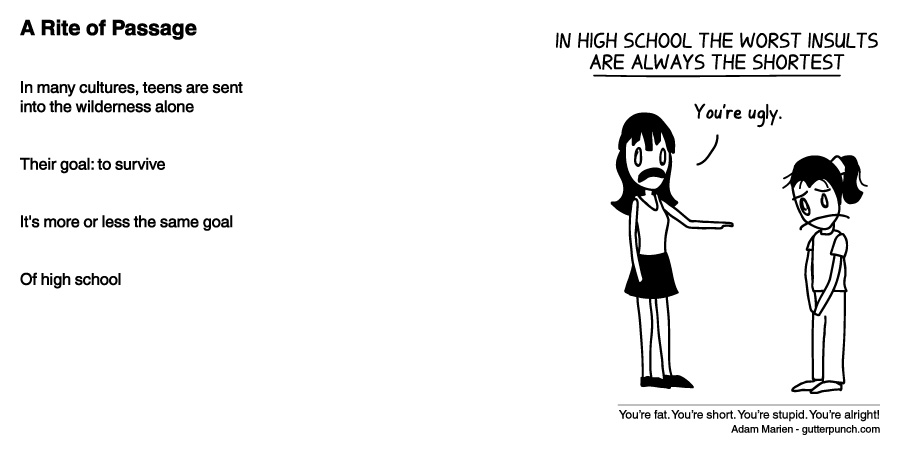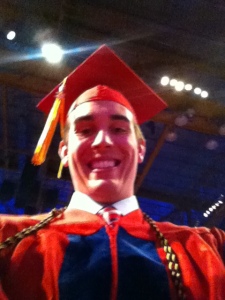Major life events such as baptisms, puberty, freshman year of high school, marriage, and death are all rites of passage or rituals that mark the transition of an individual from one status to another. The concept of rites of passage was masterfully explored by the French ethnographer and folklorist Arnold van Gennep (1873-1957) in his book The Rites of Passage, which documented the transition from childhood into adulthood among a wide variety of societies.
According to van Gennep, rites of passage have three stages: separation, transition, and reincorporation. In the first stage, individuals are removed from their previous status and they prepare to enter into their new social role. The second stage is a liminal period in which individuals are in a sort of social limbo. During the final stage, individuals assume their new status and are quite literally brought back into the fold through ceremony or ritual performance. Recently, I experienced my own rite of passage.
Separation
Dissertation defense. Word choice can seriously affect your perceptions and attitudes surrounding just about anything. On Monday, May 5, 2014 at 2:00 pm (CT) I began the most important talk of my life (thus far) and the final one of my graduate student career–the presentation of my doctoral dissertation, also known as my “defense.”
Merriam-Webster defines “defense” as the “act or action of defending” or “something that is used to protect yourself.” Given that connotation, it is difficult not to get anxious about it, and rightfully so. I spent the last two years scavenging for funding (over $40,000 in the end–thanks HARP Donors!), conducting original fieldwork far from home (in Peru), spending months in the laboratory, and staying up long nights composing a 700-page volume on 5,000-year-old ceremonial architecture in South America. Given the effort, investment, and sacrifice required to complete a dissertation it would be ridiculous not to feel at least somewhat attached to it.
I am not afraid of public speaking. I actually enjoy it. However, the idea of presenting my dissertation in front of professors, peers, friends, and the general public with the intent of not only sharing my research, but justifying it, is entirely different. My pre-presentation routine typically involves a brief review of my talking script and a quick flip through my PowerPoint slides to ensure that the animations and transitions achieve the desired effect. My dissertation defense officially started at 2:00 pm. I was in the room a whole hour early making sure the lighting was right, the chairs were straight, and my water was strategically placed at the corner of the podium within my reach. I was so restless that I played the Game of Thrones opening theme on a continual loop in order to keep my nerves in check.
As 2:00 pm approached the room slowly filled up and I simply sat off to the side in my suit–you know, that thing you wear for weddings, funerals, and college interviews. I did not realize it at the time, but I simply sat there, rigid as a board staring straight ahead while I waited. I did not utter a word to anyone. I was clearly anxious and feeling that separation.
Transition
It is customary for your adviser to introduce you to the audience. My adviser and committee chair was Dr. Jonathan Haas, a foremost expert on the archaeology of South America and the American Southwest. He can be an intimidating guy, at least if you are his student. Throughout our relationship he has pushed me intellectually and personally while always having my back and offering his support. I was in need of some of that support at 2:00 pm.
Before getting up to the podium he whispered to me that he would tell a story that he has never told anyone before. Now I won’t share what he told the audience, but it had them in stitches and things got a little bit easier for me from then on.
The presentation was the easy part for me, although a few of the audience members were a bit distraught when a black PowerPoint slide came up. I guess they didn’t expect the theatrical element of an empty slide to emphasize the period of abandonment at the site.
The 30 minute-talk was followed by the most brutal portion of the defense: the Q & A. I feel as though the questions are the hardest because there is just no way to prepare for them since you have no idea what may be asked. Someone told me going into the defense that you simply can’t worry, “because you’re the expert in the room on whatever you’re talking about.”
Regardless of the “expert status,” standing behind a podium at the front of the room while everyone watches to see how you react to intense questioning makes you want to run right out of there. Nevertheless, you have come that far and you are so close to leaving the world of graduate students to become a doctor (I hesitate to say “professor” because we all know about the tough job market) that you simply have to push through it all.
I fully felt the transition during the closed door executive session following the public defense. After the questions, everyone left and it was simply me, my committee, and the data. It was a fantastic opportunity to groupthink about my research, to make publication plans, and to intensively analyze what I had done. The experience was incredibly productive and I am grateful for the chance to have such fine scholars help me work through some interpretative hangups that I may have had.
Reincorporation
After the executive session I was excused from the room. As the door closed behind me I felt a quick burst of dread wondering if I had really done “enough.” What would they say when I wasn’t there? Those temporary fears were assuaged just 10 minutes later when I was invited back in to the room (Note: Those 10 minutes felt like an eternity to me). My adviser stood at the door with his hand held out for a handshake and he simply said “congratulations.” I replied with a hug.
I have been in school for 24 out of the 28 years that I have been on this planet. Although my formal education is over, going through this rite of passage has prepared me for a lifetime of informal learning. I could not have done it without the help of so many and I will gladly spend the rest of my lifetime giving it back.



CONGRATULATIONS!! So what was the joke? Prof. C.
Thanks! Oh I can’t tell 🙂
Congratulations, Matt!!! You are so awesome to have even thought to share your defense experience with everyone who could or could not support you in person that day. Your level of outreach just goes to show what an amazing professor you are going to be soon, Doctor! Sounds like it was an epic day!
Thanks for the kind words Jeanne.
Doctor Matt. Sounds nice 🙂
As does your account name 😛
That’s fantastic! Congratulations!!
You taught us well, and will continue to teach well.
Thanks Scott!
So what comes next?
Publishing is my number one priority right now. I will also start applying for faculty and post-doc positions in the fall. I will also begin preparing for my next project–a multisensor survey of another Late Archaic site (ground penetrating radar, magnetometry, and aerial kite photography).